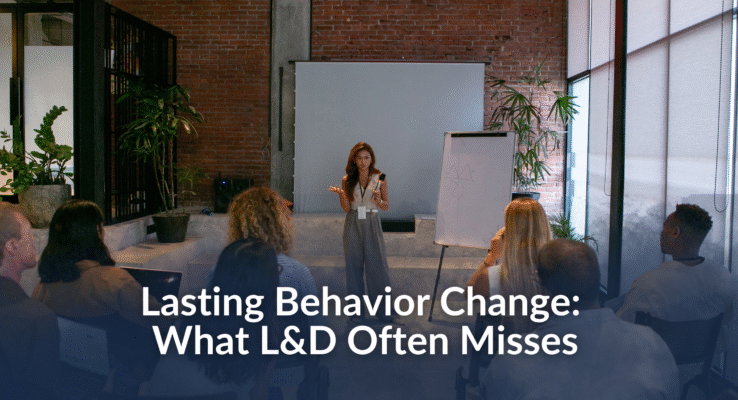The Insight
We’ve never had more tools, tech, and talent available in the L&D space. But despite all the investment, many programs still fall short of real transformation. The workshops run. The platforms hum. Feedback is positive. And yet… nothing seems to shift on the ground.
The real question isn’t whether people are learning – it’s whether they’re doing anything differently because of it.
The Missed Opportunity
It’s tempting to focus on content: building the best slides, sourcing the right models, designing memorable workshops. And of course, good content matters. But behavior doesn’t change just because someone understands a concept. It changes when that concept is practiced, tested, adapted, and reinforced.
That’s where many L&D programs stall. The learning moment ends, and people go back to their day-to-day realities. No space to apply, no structure to follow through, no accountability to stay with it. Over time, whatever they learned becomes a distant memory.
As a result, we see a familiar cycle: strong program design, positive participant feedback, limited behavior change, disappointing business outcomes.
What We’ve Learned from Experience
Across hundreds of sessions with leaders and teams, we’ve seen one truth play out again and again: real change doesn’t happen in the session. It happens in the days, weeks, and months after.
We’ve watched leaders get genuinely excited in a lab about giving better feedback – then stumble when trying to apply it without support. We’ve seen teams commit to more open dialogue – but revert to silence when meetings get tense. We’ve heard coaching skills practiced fluently in a safe setting – then forgotten in the pressure of real life.
That’s not a failure of intent. It’s a failure of design. If we want lasting behavior change, we need to design for what happens after the learning – not just during it.
What Makes Change Stick
At Solutional, we don’t view L&D as an event. We see it as a behavioral system.
Change that sticks isn’t grand. It’s consistent. It shows up in small shifts: a manager pausing to ask a better question, a team member owning a challenge more proactively, a leader reflecting before reacting. These shifts aren’t driven by inspiration alone—they’re built through design.
Here’s what works:
- Make it small: No one transforms overnight. We break learning into actions so small, they’re hard to ignore. A five-minute micro-challenge. A simple feedback tweak. A moment of reflection.
- Make it social: Change is easier when it’s visible. Through peer conversations, group challenges, and shared wins, learning becomes something we do together, not alone.
- Make it real: Theory rarely survives first contact with real life. That’s why we create environments like Solutional Lab—where people practice, test, get feedback, and refine before applying their learning in the wild.
- Make it matter: We help people connect every new behavior to something they care about—a leadership goal, a team challenge, a cultural shift. Without meaning, habits don’t last.
How Solutional Brings It to Life
With gamified microlearning, we don’t just break content into smaller chunks – we turn it into active practice. Participants get regular prompts: Try this. Reflect on that. Notice how it went. There’s light competition, small rewards, and just enough play to keep momentum going.
Solutional Lab complements this by creating space for real rehearsal. People come together not to be told what to do, but to test what works. They coach each other. Get honest feedback. Iterate their approach. The learning doesn’t just live in a module – it’s lived, tried, adapted.
To keep the change alive, we embed behavioral nudges – timely prompts that keep focus sharp. These nudges meet people where they are: in their calendars, inboxes, or Slack channels. They remind leaders of what they committed to, not in a pressuring way, but in a “you’re on a journey – stay with it” kind of way.
And throughout, we build in social accountability. Progress is visible. Cohorts check in. Leaders recognize and model new behaviors. Culture starts to shift – quietly, but powerfully.
What L&D Leaders Can Do Differently
If you’re serious about embedding change, here are a few questions worth asking:
- Do our programs end with the event – or do they begin there?
- Have we built in enough repetition, reflection, and real-life testing?
- Is there social energy around the learning – or is it siloed?
- Are we measuring behavior shifts – or just completions and feedback scores?
Because lasting behavior change doesn’t depend on how well we teach – it depends on how well we design for doing.
Let’s Make Learning Stick
At Solutional, we’ve helped organizations build systems where learning translates into daily action – and where behavior change becomes a cultural muscle, not a training objective.
If you’re looking to move beyond knowledge transfer and build programs that actually transform how people show up, we’d love to collaborate. Let’s talk about how gamified microlearning, real-world rehearsal labs, and intentional habit systems can make your L&D investments deliver what they’re truly meant to: visible, measurable, lasting change.
